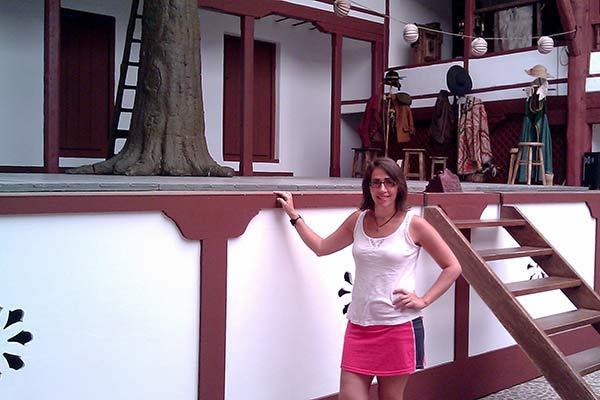
Welcome, Deborah Forteza, to our Student Spotlight! Deborah is a graduate student in the Ph.D. in Literature Program who applied for a Graduate Travel and Research Grant. Her dissertation, titled "The Politics of English Tolerance: Reimagining a Tolerant Spain through Cervantes' La española inglesa," necessitated a trip to Spain to conduct archival research. Deborah recently wrote to us about her experience:
My trip was strategic because it furnished me with important resources for my dissertation research in several Spanish archives. In Madrid, I consulted non-digitized, first editions of ecclesiastical histories at the Biblioteca Nacional, microfilm of letters at the Archivo General de Palacio, and the largely uncatalogued library and correspondence of the first Count of Gondomar at the Biblioteca Real. I also spent two weeks in Valladolid at three different locations: the archives at Saint Alban’s English College (a private archive dating back to the late 16th century whose catalog and manuscripts are unpublished), the Archivo General de Simancas (a national archive containing a large section of unpublished early modern Anglo-Spanish documents), and the Biblioteca Histórica de Santa Cruz (a small, but old archive managed by the University of Valladolid).
Each day at these archives I was given old, frail letters, books, and documents; and sometimes I needed to wear gloves to handle them. I was excited to be able to read intricate handwriting that before taking a paleography course looked like scribbles, to read documents from figures such as King Philip II, and to discover obscure letters discussing matters examined in my dissertation. In addition to the copious notes that I took of specific references, reading these materials gave me a better sense of the characters and atmosphere surrounding the culture of my research period. Because these works and often the catalogs listing them are unpublished, I would not have found this information had I not traveled to Spain. In addition, the invaluable guidance of the archivists on location led me to different archives and materials that I was unaware were useful for my subject.
While in Spain, in addition to meeting all my trip goals beyond my expectations, I was able to see a representation of the play I discuss in my dissertation, and to meet one-on-one with Anne J. Cruz, a premiere early modern Spanish scholar who was also conducting research at the Biblioteca Nacional while I was there. Both of these experiences enhanced an already very productive trip. Therefore, I am very grateful to the Nanovic Institute for awarding me the Graduate Travel and Research Grant that has made possible this crucial trip at this critical point in my professional career.